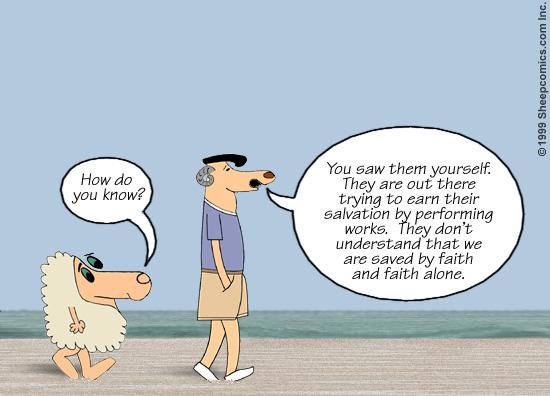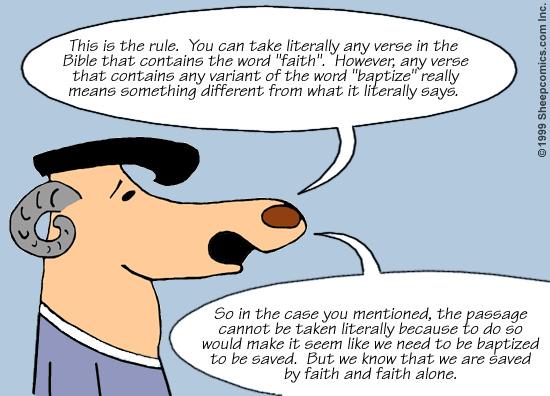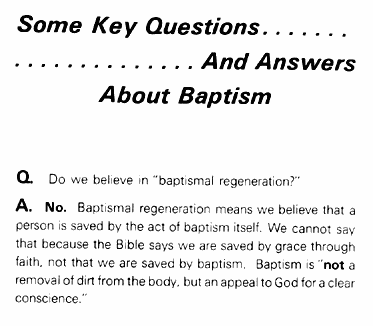







Editorial Notes
OK, Iíll Confess
I am a legalist. Yes. Itís true. I am what a "real" Christian isnít supposed to be.
I believe we are all legalists to one degree or another. We all have internal "laws" that govern the way we relate to those in our family, to those at work, and to God. We believe that If we, and they, follow certain rules in these relationships, then everything is OK. We set an unspoken standard for ourselves and an unspoken standard for others. Things get ugly when someone tells us we should do something differently, or when someone doesnít meet our expectations.
An Observation: The New Covenant is a Covenant
Now, back to Christianity. I said I was a legalist, and you may be waiting for me to apologize for my legalism, but Iím not going to. Not yet. You see, I had to become a bit of a "legalist" to understand the New Covenant. Thatís because the New Covenant is ÖuhÖ a covenant.
A covenant is a binding agreement between two parties. If we read the Bible, we see that God has a history of dealing with mankind through covenants. What we call the Old Covenant, Godís covenant with Israel, had a list of blessings conditioned on obedience and a list of curses which came with disobedience. As far as I can tell, a male came into this covenant by being born an Israelite and by being circumcised when eight days old. I guess a woman just had to be born an Israelite.
The New Covenant is also a binding agreement. This binding agreement isnít between God and a nation, but between God and any individual who chooses to enter into the covenant. Those who enter the covenant and stay in it will receive eternal life and an inheritance. Those who do not enter into it or enter it and fall away will experience the "second death", which is the "lake of fire".
I want the eternal inheritance, not the lake of fire. So, I want to be in a covenant relationship with God. Not just any covenant, but the one God created. What must I do? I must find out what is required to enter the covenant. Where is the New Covenant in the Bible? Where are the instructions for my entrance into it?
Where is the Covenant?
The New Covenant is in the New Testament of the Bible. I do not use the terms interchangeably. When we say "New Testament", we typically mean the "Christian part" of the Bible. That is, Matthew through Revelation. But the New Covenant didnít begin with Matthew 1:1. Jesus had to die to put the New Covenant into effect. As the writer of Hebrews went to great lengths to explain in Hebrews 9 through 13, the New Covenant was inaugurated by Christ shedding His blood. The New Covenant was not in effect before Christ died on the cross.
So, in our search for the New Covenant in the New Testament, we have to begin chronologically at the point right after Christ died. When is the first time we see Jesus or His apostles telling non-believers how to enter into a covenant with God? We donít have a record of Jesus, or any of the apostles, teaching non-believers in the time between His resurrection and ascension.
How about after the ascension of Jesus? The gospels of Mark and Luke end with the ascension of Jesus, and the book of Acts has the ascension six verses from the beginning. Luke wrote Acts. Now there is some great continuity! But where does the New Covenant begin? Acts chapter 2.
There it is!
The first major event after the ascension of Jesus is the replacement of Judas Iscariot. The second major event is a miraculous manifestation of the Holy Spirit followed by the first gospel sermon. Peter, full of the Holy Spirit, preaches to the crowd that had gathered while the disciples were miraculously speaking other languages. Peter explains to them that God had made the same Jesus whom they crucified both Lord and Christ (Messiah). Here is what happens next:
Now when they heard this, they were pierced to the heart, and said to Peter and the rest of the apostles, "Brethren, what shall we do?" And Peter said to them, "Repent, and let each of you be baptized in the name of Jesus Christ for the forgiveness of your sins; and you shall receive the gift of the Holy Spirit. "For the promise is for you and your children, and for all who are far off, as many as the Lord our God shall call to Himself." (Acts 2:37 Ė 39, New American Standard, Copyright The Lockman Foundation)
This is covenant language. Repentance (turning towards God) and being baptized (immersed) in the name of Jesus Christ is "for" the forgiveness of sins and the receipt of the gift of the Holy Spirit. This promise is for everyone the Lord our God shall call to himself.
But it Doesnít Really Mean That!
There are many people today that simply refuse to believe that this passage really means what it seems to obviously say. They go into great detail about how behind the English word "for" is the Greek word "eis", and that "eis" really means "because of". So, this passage really means that we should repent and be baptized "because of" the forgiveness of sins, or because forgiveness has already taken place. Now, I donít want to make this a complicated Greek study, but I will make a few observations.
First, the interlinear Greek New Testament thatís in front of me right now (see below) has the words "with a view to" under "eis" in Acts 2:38.
Second, the Theological Dictionary of the New Testament that is in front of me right now (see end of article) tells me that there are many ways "eis" is used in the New Testament. I went through all of them three times and failed to find "because it happened", but I did find "with a view to some end".
Third, although I have read many papers which go into detail trying to prove that "eis" means one thing or another, I have yet to see the same kind of study of "and". Remember that the promise is "repent, and let each of you be baptized". "Repentance" and "baptism" are joined by the word "and". The Greek word for "and" here is "kahee". According to my Strongís Lexicon, "kahee" means "having a copulative and sometimes also a cumulative force". In other words, repentance and baptism are joined together. If "eis" means "because of", then I would think Peter meant that repentance and baptism both occur because our sins are forgiven. How can repentance occur because our sins have been forgiven? I always thought that repentance comes before forgiveness.
So, I believe that Peter meant exactly what he said, and that a person needs to both repent and be baptized to be forgiven of their sins and to receive the gift of the Holy Spirit.
Today, many "orthodox" Christians would label me a "legalist", or worse, simply for believing what this passage most obviously says. They might say that I donít have "real" faith. "Real" faith is the belief that we are saved by "faith and faith alone". Rarely do any of the "faith elite" attempt to define what "faith" really is. What was the Greek word for "faith" and what did it imply in the first century? Who cares? Surely nothing has changed. We completely trust our English bible translations with the word "faith"; itís only where the word "baptism" is used that our English bibles donít really mean what they say.
You donít believe me? Here are two more examples.
It Doesnít Mean That, Either!
Mark 16:16 is one passage that many are sure cannot mean what it says. Here it is three different ways.
Whoever believes and is baptized will be saved, but whoever does not believe will be condemned. (New International Version, North American Edition, Copyright International Bible Society)
He who has believed and has been baptized shall be saved; but he who has disbelieved shall be condemned. (New American Standard, Copyright The Lockman Foundation)
The one believing and being baptized will be saved, but the one disbelieving will be condemned. (from The NASB-NIV Parallel New Testament in Greek and English with Interlinear Translation by Alfred Marshall Copyright 1986 by The Zondervan Corporation)
Below is a modified version of a genuine argument I found somewhere on the Internet. I changed the objects and left the logic intact.
"Whoever starts their car engine and turns on the radio will be
able to drive to work."
Does the fact that two conditions are listed in connection with
driving to work mean that both conditions must be met in
order for someone to be able to drive to work? If I were
to start my car engine but failed to turn on the radio would I
still be able to drive to work? Of course.
Well, if the creator of the car designed it so that the radio had to be on before the transmission would engage, then I would have to start the engine and turn on the radio to drive to work. If this was a new car and this is what the ownerís manual said, and I believed the manufacturers knew what they were talking about, then I would start the engine and turn on the radio before I pulled out of the driveway. If I trusted the manufacturer enough to buy the car, I would obey the ownerís manual. If I already "knew" how cars are "supposed" to work, I would assume the manual was written by a liar and proceed to drive the car they way I "know" is right.
This is what numerous "bible scholars" have done to Mark 16:16. They set up analogies where they combine two conditions that seem related but arenít dependent on each other. Then they demonstrate their "insight" by explaining that even though the two conditions seem connected, they really arenít. Only the first condition counts. The first condition of their analogy, of course, is the one that corresponds to "believe" in Mark 16:16. This proves that what Mark 16:16 "really" says is that whoever "believes" will be saved, and baptism doesnít really matter.
What these "bible interpreters" are doing is deciding in advance how the New Covenant is supposed to work before they even try to learn about it. They "know" that only "faith" matters. They "know" that "faith" and "believe" are synonymous. So it follows that they "know" that "believe" is what counts (the thoughts) but not baptism (the action). They have made up their own standard, a "law", that even Jesus must conform to. They already "know" that the simple, direct, words of Jesus canít be true. Then they make up analogies with pre-determined ridiculous outcomes, and then apply these to the words of Jesus.
What these individuals forget, or have never learned, is that Jesus is the mediator of the covenant. The mediator of a covenant is the one who says how a covenant works. The Apostle Paul is not the mediator of the New Covenant. Paul wrote a lot about grace and faith. Paul didnít write about grace and faith to contradict Jesus or to prove that baptism is not necessary. He didnít write about grace and faith so people today could take his words out of context, bracket them with little dots, and splatter them on evangelical tracts and flyers. Paulís writings about grace and faith need to be understood in their context. Remember, Paul was serving Jesus.
Trust Us, Itís Not in the Bible
Below is an image from a tract on baptism I picked up at a large "orthodox" evangelical church a few years ago. There is no copyright language on it. I reproduced one particularly interesting piece of it below.

According to the writer of this tract, "The Bible says that we are saved by grace through faith, not that we are saved by baptism". Then there is a quote from the Bible, but the chapter and verse arenít noted. The passage is 1 Peter 3:21, or at least part of it. The beginning of this passage was edited out, so Iíll put it back. Letís see the entire passage. I think I even found the same English translation.
This prefigured baptism, which saves you now. It is not a removal of dirt from the body but an appeal to God for a clear conscience, through the resurrection of Jesus Christ, who has gone into heaven and is at the right hand of God, with angels, authorities, and powers subject to him. (1 Peter 3:21-22 New American Bible)
I have often wondered what the person who wrote this tract was thinking when they edited out the Apostle Peterís "baptism, which saves you now" and wrote "not that we are saved by baptism".
Arenít we saved by "grace through faith"? I think this is from Ephesians 2:8. Of course. Godís grace is His unmerited favor. Any covenant with God is Godís gift. We donít earn the right to be in a covenant relationship with God. We exercise faith by taking God at his word and obeying Him.
Put the Scalpel Away!
I have read and head many words from people trying to determine at exactly what point in space and time we are "saved". Is it when we first believe, intellectually, that Jesus is the Son of God? Is it when we are baptized? Even many people who believe in the necessity of baptism get caught up in this obsession with trying to determine exactly when they are saved. What saved us, belief or baptism?
We know that baptism alone canít save us because simply getting wet does nothing if we donít believe. All the baptisms in the New Testament were performed on those who first believed. (As you might guess, I donít believe in infant baptism.) But with belief and baptism mentioned together in so many places in the New Testament, it sure seems that belief alone isnít enough either. What do we do?
I believe that we need to stop dissecting belief and baptism and playing them off against each other. Itís not about one or the other; itís about both. The baptisms in the New Testament were performed on people who believed that Jesus is the Son of God. First belief, then baptism. It seems that God wants us to believe and then to perform a simple act of obedience. (There really isnít much to perform. I didnít "perform" very much when I was lowered into the water and pulled out.) First we understand in our minds, then in baptism we commit. It only gets "hard" and "confusing" when we have already decided that God isnít supposed to work that way.
Maybe itís about Trust
Believe it or not, two of my primary reasons for believing in the necessity of baptism for salvation are not from the New Testament. One if from the Old Testament, and the other is from the second (or early third) century.
In 2nd Kings 5 we have the story of Naaman, the valiant warrior captain of the army of Aram. He came to the prophet Elisha to be cleansed of leprosy. Elisha told Naaman to wash in the Jordan river seven time to be cured. Naaman got mad because this isnít what he expected. Naaman had his own "law" in his mind, a preconceived notion of how God works. Naaman thought he would just stand there while Elisha waved his hands and called on God. Naaman was surprised when Elisha told him to do something that was simple but didnít seem to make any sense. Naaman had enough faith to stand there and do nothing, and enough faith to do some great thing, but it was very hard for him to summon enough faith to do something simple enough to seem meaningless.
Maybe, just maybe, that is why we are commanded to be baptized. It takes a certain kind of trust to do something seemingly insignificant simply because you are told to do it. Itís the kind of trust a child has in a parent. Itís easier to believe that someone else who is "plugged in" with God can arrange to have your problems zapped away while you do nothing. Itís even easier to believe that if we do some great and difficult thing, we will be rewarded accordingly. Thatís the way the world works.
Tertullian, one of the Early Church Fathers wrote a letter on baptism about 200 AD. He pointed out how the very simplicity of baptism can keep people from believing what God says about it.
Well, but how great is the force of perversity for so shaking the faith or entirely preventing its reception, that it impugns it on the very principles of which the faith consists! There is absolutely nothing which makes men's minds more obdurate than the simplicity of the divine works which are visible in the act, when compared with the grandeur which is promised thereto in the effect; so that from the very fact, that with so great simplicity, without pomp, without any considerable novelty of preparation, finally, without expense, a man is dipped in water, and amid the utterance of some few words, is sprinkled, and then rises again, not much (or not at all) the cleaner, the consequent attainment of eternity is esteemed the more incredible.
What about the child who dies before being baptized? I trust God.
What about the person who believes and tries to get baptized as soon as they can but dies first? I trust God.
I Apologize
To most people these days, the world "faith" means whatever our turn-of-the-21st-century American culture says it means. Faith is what you believe in your head to be true. It follows that the "faith" that saves us is the "faith" we demonstrate by getting the neurons between our ears to fire in such a way as to think right about Jesus. We seem to unconsciencly believe that all reality is divided into two separate spheres, the sphere of thought and the sphere of tangible matter. It has been decided in advance by our pop-Christian culture that the sphere of thought is where the "real" stuff happens. All that occurs outside our skulls is "works", and we know "works" donít save us. Jesus bought the thought. Matter doesnít matter.
Is this really the faith God recognizes, or is it just a pre-conceived standard we have created for God before we even start learning about Him? Is it possible that we credit ourselves with having faith in God when really all we have is "faith in faith"?
Of course, this approach to faith serves our American lifestyle very well. It allows us to live as we please as long as we believe all the right things in our heads. And life in America, with all the disposable time and income available, can be very pleasing. When "the futureís so bright, you gotta wear shades", faith in faith wonít get in the way. This is the faith that sells.
Am I legalistic? You bet! Again, I believe that we are all legalists. We all make up laws. I just want to be a good legalist. I want to know what the law really is, and where the law really comes from. Whatever law there is in the New Covenant begins with the words of Jesus.
Today, many who claim that we are saved by "faith and faith only" are really just legalists in denial. They have a "law" that says that all scripture that pertains to salvation or forgiveness can only be understood in the light of what Paul wrote about faith. They donít take time to understand the context of these passages Paul wrote. However, they will take a lot of time to apply their understanding, or lack thereof, to other scriptures. Not even scriptures that record the words of Jesus are exempt from this "law". Do they ever consider the fact that thousands of people became Christians before Paul did?
Those who follow this particular kind of "faith only" legalism will write huge documents "proving" that baptism is not necessary for salvation. They do word studies and Greek studies to show that these passages donít really mean what they say in English. They throw their favorite "faith" passages at their target "baptism" passages as if one scripture can cancel another. They use the writings of Paul as if to invalidate the words of Jesus and Peter. Like any legalist, they look at the New Testament as a legal contract. However, instead of looking for rules, they look for loopholes.
Once they find all the loopholes and "prove" that baptism isnít a saving response to the gospel, they proceed to make up their own response to the gospel. They ask those who are "pierced to the heart" by the gospel to pray a "sinners prayer" to get saved. Jesus never commanded this. None of the writers of the New Testament said that a prayer could save us. There is no record in the Bible of a person praying a prayer to "get saved". The "faith only" legalist doesnít apply his own standards to his own doctrine. Why should they? They "know" that "real" faith is in the mind, and prayer is an exercise of the mind. I think, therefore I am saved.
I said I would apologize for being a "legalist". I really already have. In my Websterís Dictionary, the word "apologize" means "to make an apology". The first definition for "apology" is "a formal justification". That is what Iíve tried to do. Please accept my apology, or at least consider it.